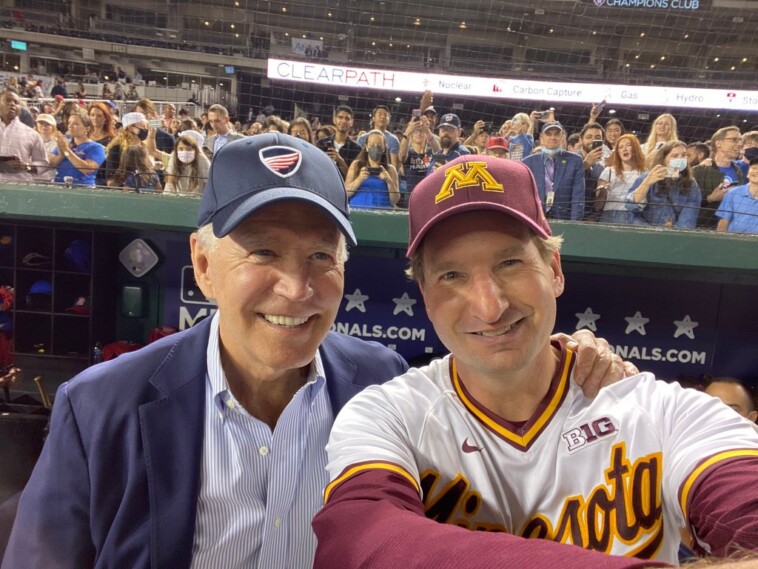President Biden admitted in a March phone call to Rep. Dean Phillips that had Biden been a younger lawmaker, he too would have challenged an aging commander-in-chief — before promising his Democratic primary opponent a White House meeting that “never happened.”
Phillips, 55, said that the day he abandoned his campaign against Biden, 81, the two “had a wonderful conversation” that ended in an invitation to discuss the state of the 2024 race at the executive mansion, the Minnesota Democrat told the Washington Post Friday.
“He said he would have done the same thing — meaning, had the same [thing happened] some years ago, that he probably would have entered the race,” recalled Phillips, who is leaving Congress after this term.
“He invited me into the White House to download and share any perspectives that I wished. Unfortunately, that meeting never happened.”
Phillips launched his primary challenge in October 2023, pointing to Biden’s already disastrous polling numbers “that are so clearly saying that we’re going to be facing an emergency next November.”
“I’ve been listening all around our country, and I know things are tough right now,” his campaign’s X account posted at the time.
“The economy is not working for everybody. We are concerned about chaos at our border and crime in our communities. We’re going to do better and we’re going to do it together!”
In 2023, Biden’s approval rating twice hit a low of 37%, fueled by voters’ increasing dissatisfaction with rising inflation and unchecked migration across the southern border.
A majority of Americans were also citing concerns about Biden’s mental fitness in public polls.
Phillips later told The Post that, given the challenges, which also included worsening conflicts abroad in Ukraine and Israel, the president’s age was disqualifying.
“We’re human beings, and I think it’s irresponsible for Americans to place in the White House presidents who are in their 80s. I think it’s wrong, I think it’s dangerous,” he said at a campaign stop in New Hampshire in December 2023.
A “crisis is always around the corner” when “you reach your 80s,” he added, noting that America can’t “take that risk in an era like this.”
Though Phillips dropped out after Biden became the presumptive Democratic nominee on Super Tuesday, his assessment proved strikingly accurate.
“Those of us who had our ears to the ground and were listening and spending time around the country sensed two things,” he told the Washington Post. “One, the growing disdain for the Biden administration — which I don’t believe was deserved. And secondly, the growing attraction to Donald Trump amongst constituencies that heretofore had been much more closely aligned with Democrats.”
The most vindicating event of the 2024 election cycle for Phillips was Biden bombing at the first presidential debate against Trump on June 27, speaking in a soft, raspy voice and displaying a flimsy knowledge of his own administration’s achievements.
The dismal performance also included non sequiturs — “Look, we finally beat Medicare” — that implied real cognitive impairment.
Powerful party leaders like House Speaker emerita Nancy Pelosi (D-Calif.) and big-money Democratic donors pushed Biden off the 2024 ballot.
On July 21, the president abandoned his re-election campaign and endorsed Vice President Kamala Harris to succeed him.
Harris, 60, was later elevated by Democratic delegates to be the party’s 2024 nominee without a single primary vote.
Despite Biden’s massive unpopularity with the American electorate, however, Harris did not seek to distance herself from him.
Asked last month on ABC News’ “The View” whether she would have done anything differently over the past four years, Harris replied, “There is not a thing that comes to mind in terms of — and I’ve been a part of — of the decisions that have had impact.”
Phillips said the undemocratic efforts by the DNC to crush “a competitive primary” were fatal.
“Do I believe if my party had heeded the call to promote and encourage a competitive primary that we would have identified a candidate perhaps better positioned to win? Absolutely,” he said Friday.
“[But Harris] was not in an enviable position to have essentially 90 days to put together a campaign of such breadth and depth and cost, still serving as vice president to a very disappointed president and feeling some obligation to refrain from disparaging or even showing separation. That is another reason she lost — the unwillingness to show that separation.
“I will not throw stones at any individuals, but I will say that those who actively prevented a primary and suppressed competition and prevented platforming on MSNBC and other left-leaning media platforms — they are the ones that should shoulder the blame for what transpired on Tuesday,” he concluded.
Democratic strategists like longtime Bill Clinton ally James Carville have also said that “unwillingness” by Harris to contrast herself with Biden lost her the race.
“If you’re in a country where, for whatever reason, 65% of people think you’re on the wrong track, you have to run as a change candidate,” Carville told the Ankler in an interview. “That’s the money question! That’s the one you win on.”
“I’m not certain that any Democrat would have won this year,” Phillips disagreed. “We have to just acknowledge that Donald Trump is more than a passing fad. He’s become a significant historical figure in American politics, and he built a movement that, frankly, snuck up on most Democrats.”
“There’s going to be a very public battle, I think, between the left wing of the Democratic Party and the moderate wing,” he predicted.
Phillips’ only regret from his campaign against Biden, meanwhile, is that he “conceded a little bit too early.”
“I am disappointed that I wasn’t able to make my case more successfully,” he said. “And that’s on me.”









